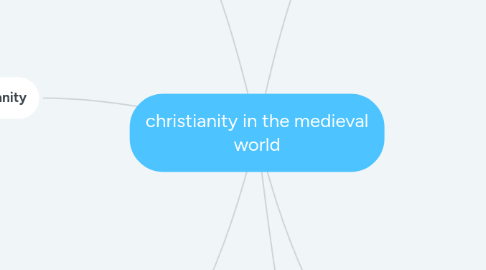
1. advent of christianity
1.1. it comes from the
1.1.1. old testament
1.1.2. dead sea scrolls
1.2. jesus
1.2.1. son of mary and joseph
1.2.2. born in the village bethlehem in judea
1.2.3. studied jewish scriptures and his interpretation clashed with the jewish ideas from the pharisees who were the jewish religious leaders
1.2.4. wherever he went his popularity grew
1.2.5. jesus and his followers posed a threat to the pharisees
1.2.6. so Pontius Pilate executed jesus by crucifixion
1.2.7. on the third day he was said to come back to life, known s resurrection celebrated by christians as easter
1.2.8. teachings of jesus
1.2.8.1. they are recorded in the four canonical gospels- mathew, mark, luke, and john
1.2.8.2. advocated a code of conduct
1.2.8.2.1. unconditional love for god
1.2.8.2.2. true love for your neighbour
1.3. the christians started assembling to discuss christian teachings
1.3.1. these assemblies came to be known as a church
1.4. all the books together are called the biblical canon
1.4.1. the biblical canon consists of the bible
2. christianity in the roman empire
2.1. Constantine
2.1.1. according to jews christianity was an illegal religion
2.1.2. however the accession of Constantine in the 4th century, saw an increase in christianity
2.1.3. in the edict of milan, Constantine agreed to treat christians belovelently
2.1.4. constantine became the first roman empire to make christianity a legal religion
2.1.5. he supported the churches financially and built various basilicas
2.1.6. he built a new capital at byzantium which came to be known as constantinople (now Istanbul)
2.1.7. in the end of the fourth century ce christianity became the new official religion
2.1.8. st. peter's church became the home of the spiritual leader of the christians
2.1.9. the constant attack of non-christian tribes weakened the roman empire
3. byzantine empire
3.1. the roman empire was divided into two parts
3.1.1. eastern roman empire
3.1.2. western roman empire
3.2. in the 6th cen ce the western roman empire started disintegrating, but the eastern roman empire continued for more time
3.3. byzantine empire became the seat of the orthodox church and the west became the seat for the roman catholic church
4. spread of christianity
4.1. christianity was spread all over europe
4.2. it was spread by
4.2.1. monastries
4.2.1.1. monastries were the residence of monks
4.2.1.2. women who devoted their life to god were called nuns
4.2.1.2.1. their palce of residence were called convents
4.2.1.3. impact of monastries
4.2.1.3.1. they became places of religious and secular learning. they developed into oxford and cambridge universities
4.2.1.3.2. monastries provided shelter, food and clothing to the poor
4.2.1.3.3. they were responsible for the spread of christianity to other religions
5. crusades
5.1. it was the fight for the holy land of jerusalem
5.2. it was fought between the army of the pope and the turkish muslims
5.3. there were eight crusades
5.4. consequenses of the crusades
5.4.1. the crusaders came in contact with the greek culture, and accquired knowledge which paved the way for the renaissance
5.4.2. they learnt the use of gunpowder from the turks
5.4.3. new trade routes were opened to cater to the newly accquired testes of the crusaders
5.4.4. the power of the king increased
